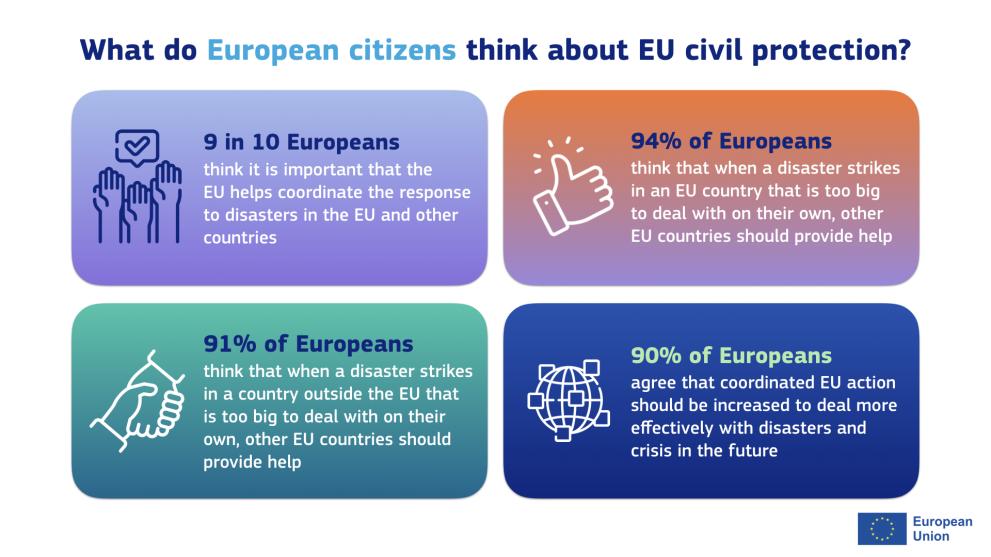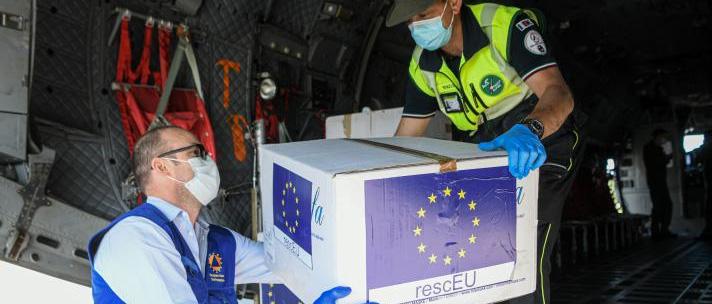What is a Eurobarometer?
Eurobarometer surveys monitor the evolution of public opinion in all 27 EU Member States. The aim is to assess EU citizens’ awareness of and support for the European Union's activities. Tracing public opinion trends helps the preparation of policy, decision-making, and the evaluation of the EU's work.
An image consisting of 4 colourful boxes placed in 2 rows and 2 columns.
At the right bottom the European flag with the text ‘European Union’.
Box 1 reads: 83% of Europeans feel pride, enthusiasm or satisfaction when thinking about the EU being amongst the main donors of humanitarian aid.
Box 2 reads: More than 9 in 10 Europeans believe that it is important that the EU funds humanitarian aid activities.
Box 3 reads: Nearly 9 in 10 Europeans think that the EU should keep the current spending or invest more in humanitarian aid activities.
Box 4 reads: 71% of Europeans believe that humanitarian aid is more efficient if coordinate by the EU as a whole.
The 2023 results show a continuing and overwhelming level of support for EU action on humanitarian aid:
- 91% of respondents think it is important that the EU funds humanitarian aid activities;
- 71% think that humanitarian aid is more efficient if coordinated by the EU as a whole;
- when asked about the EU humanitarian aid budget, nearly 9 in 10 Europeans think that the EU should keep the current level of spending or even increase it.

The European Union, together with its Member States, is one of the leading donors of humanitarian aid in the world.
A large majority (83%) of Europeans have positive feelings towards EU’s leading role in financing humanitarian aid, of which more than half (56%) feel satisfaction, 17% pride, and 10% enthusiasm.
Read the full results of the latest Eurobarometer on humanitarian aid
The 2023 survey results show clear support for the EU’s role in crisis management:
- 9 in 10 respondents state that it is important that the EU helps coordinate the response to disasters in the EU and other countries;
- an overwhelming majority of respondents (94%) in the 27 EU Member States think that when a disaster strikes in an EU country, that is too big to deal with on their own, other EU countries should provide help;
- nearly the same number (91%) are supportive of the EU helping any country in the world affected by a disaster that overwhelms their response capacities;
- 9 in 10 Europeans agree that coordinated EU action should be increased to deal more effectively with disasters and crises in the future. The proportion of EU citizens who want a stronger EU role in crisis management has increased by 7 percentage points since 2020.
Read the full results of the Eurobarometer on EU civil protection

The 2024 special Eurobarometer to measure the level of awareness and preparedness of the EU population towards disaster risks shows the following:
- 50% of Europeans say their country is most at risk of extreme weather events like violent storms, droughts, heatwaves, or cold waves.
- 44% think their country is at risk of floods, including river or coastal floods, or heavy rain events.
- 33% feel their country is most exposed to cybersecurity threats, like cyberattacks or cybercrimes;
- 32% feel their country is most exposed to political or geo-political tensions, for instance civil unrest, or social divisions;
- 31% feel their country is most exposed to human health emergencies, for example a highly contagious disease outbreak
- 31% feel their country is most exposed to wildfires or forest fires.
Read the full results of the Eurobarometer on Risk awareness and preparedness

